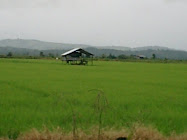Kota Kinabalu, January 19 (Bernama) - Former Internal Security Act (ISA) detainee Hasnar Ebrahim shocked a lot of people, particularly the locals, when he exposed a Malaysian identification card (IC) scam or known as Project IC in Sabah, in a recent interview with a local newspaper.
The locals here are stunned as many of them who reside in the state's interiors have yet to own the sophisticated Malaysian IC or MyKad, but based on Hasnar's claims, it seems the card was easily accessible to foreigners.
While Project IC is not a new issue in Sabah, it continues to be debated by many who express concern as the matter is related to the issue of illegal immigrants in Sabah which is perceived as the mother of all social woes in the state.
Hasnar, an entreprenuer, confessed that he unknowingly became involved with others who made it possible for thousand of foreigners to secure Malaysian IC.
The former Sandakan district chief, while refusing police's request to make a statement on the issue, however, is willing to give testimony in court.
Hasnar was detained under ISA on Aug 9, 1998 for two months, and then place under house arrest for two years in Sandakan from Sept 6, 1998. He was also among the material witnesses in the Likas election petition trial in 1999.
Meanwhile, Sabah Party Keadilan Rakyat (PKR) deputy chairman Datuk Dr. Jeffrey Kitingan has claimed that currently there are 1.7 million foreigners in Sabah, including 600,000 who posses the IC.
Responding the allegation, former Sabah chief minister Datuk Seri Salleh Said Keruak challenged Dr. Jeffrey to list the names of the 1.7 million people but the later has so far not done so.
Sabah chief minister Datuk Seri Musa Aman said the state government viewed the matter very seriously and was doing all it could to solve it.
He asked those who exposed the issue to come forward and cooperate with the police.
"Do not simply talk through the newspaper. Cooperate with the authorities", said Musa, who also directed the National Registration Department (NRD) an the Immigration Department to explain the issue to the public in the interest of all.
Following the exposure, sabah police commissioner Datuk Mohd Mokhtar Hassan had requested Hasnar to assist police in the investigation.
He said police could not complete the investigation into Project IC without the cooperation of those with informations.
As such the police were putting Hasnar's statement on the issue on record to speed up the investigation, he added.
Mohd Mokhtar said the police would not arrest Hasnar or anyone without sufficient proof to link them with the criminal activity.
Several residents here met by Bernama, however, admitted they were from the Phillipines and had secured the Malaysian IC through the said Project.
"True Project IC exist. I secured my IC from the project in the early 1980's" said Fuad Arif from Tawi-Tawi island, the Phillipines, who now resides in Kampung Sabang in Menggatal, near here, with his family.
According to him, he came to Sabah in the mid-1970's with his parents, and they had stayed at Pulau Mantanani before moving to the village.
"After living here for several years, I finally received my Malaysian IC in 1984. At that time, a middleman came to our village to distribute the cards".
"I still remember the middleman coming to every house in the village to fill up forms for the IC and collect the fee of about RM10 each for stamp duty".
"One of the documents used to support the IC application was the late birth certificate registration letter", he recalled.
Fuad said that once the IC were ready, the middleman would return to the village to distribute the cards to the residents, who were immigrants and had lived there for a long time.
In fluent Bahasa Melayu, he said that his family believed that they would have better future in Sabah compared to Tawi-Tawi.
"There is no unrest here. We are free to roam anywhere we want. We can go to Tanjung Aru, Mount Kinabalu or Kota Kinabalu", said Fuad, who is the holder of the IC bearing registration number H0504993.
Earlier, Parti Bersatu Sabah (PBS) secretary general Radin Maleh had questioned the authenticity of ICs with numbers starting from H0288001 to H0384000 involving 96,000 holders; H0480001 to H0576000 (96,000); H0609601 to HH0610000 (400); H0658001 to H0658200 (200); H0658401 to H0659000 (600) and H0666001 to H0666400 (400), saying he had taken up the matter in the Dewan Rakyat when he was the member of parliament for Tenom.
Another Kampung Sabang resident, Jamili Bungsu, 53, said the issuing of IC under the project was rampant in the early 1980's until 1985.
"Just imagine in the early 1980's at Kampung Pondo in Pulau Gaya (near Kota Kinabalu), there were only about 10 houses there. But the number soon increased to almost 500 squarter homes whose occupants were immigrants from the Phillipines".
"It was not their fault that there were locals who were willing to arrange getting the ICs for them. Not many knew who were the masterminds behind the operation. It might have been done by those with high rank as it was not easy to make an IC:, he said.
Jaidi Kamlun, 26, from Kampung Pulau Gaya, said most immigrants who secured the ICs trough the project had been living in the country for a long time and were involved in the state's development projects.
He said in Pulau Gaya alone, there were now more than 10,000 immigrants from the neighbouring country and most of them were helped by locals to get the ICs.
"Of course the immigrants would grab the golden opportunity as it required no documents. Furthermore, they wanted to stay here. Most of them now have MyKads and can vote. As far as i know, the project not only benifited Filipinos but those from Indonesia, India and China. The modus operandi was the same, that was through a middleman".
He said it was unfair to link immigrants holding IC with criminal activities in Sabah.
"Perhaps some of them involved in criminal activities or social problems but not all. Society's perception is inaccurate as we came here to earn a living".
"Our parents have lived in Sabah for a long time, and as a new generation, we do not desire to return to the Phillipines. We are like the locals who love and are loyal to Malaysia", he said.
Jaidy supported the government's effort to send back illegal immigrants to their home countries and prevent them from re-entering Malaysia.
"Lets bygones be bygones. There is no need to determine whose fault it was. Let's work together towards a better Sabah", said Jaidy, who received his education up to Form Five here.
His view was echoed by his village friend Tamskie Abdul Said, 36, who said that until now, nobody knew who were the masterminds of the IC project that involved Pulau Gaya residents.
"Project IC was different from those involving fake identification cards. The immigrants preferred Project IC as fake ICs did not allow voting rights and the holder would be repartiated if caught by the police", he said
Several quarters including political parties and non-governmental organisations in sabah have expressed concern over the existence of Project IC as it could threaten the country's security and deny genuine citizens employment opportunities as blue coller workers.
In this regards, they have appealed to the government to set up a Royal Commission of Inquiry to get to the bottom of the issue and ways to resolve it.
The state and federal government are also aware of the illegal immigrants problem in sabah.
Even the Barisan Nasional component parties including the PBS, United Pasok Momogun Kadazandusun Murut Organisation (UPKO), Sabah Progressive party (SAPP), Liberal Democratic Party (LDP) and Parti Bersatu Rakyat Sabah (PBRS) have been vocal in expressing their concern over Project IC. - BERNAMA
Manager Alonso leaves Real Madrid after eight months
7 minutes ago




